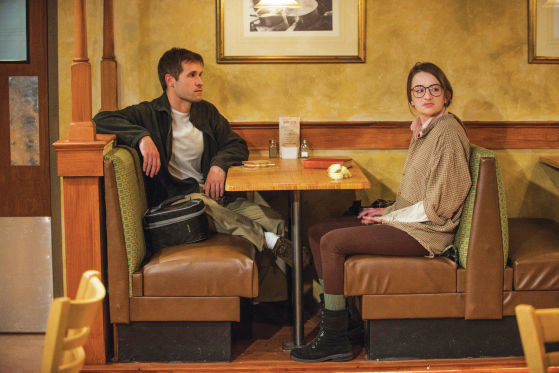
Since this is a Samuel D. Hunter play, the setting for Pocatello is a nondescript town in Idaho whose business district is dominated by big-box stores and chain restaurants—specifically, a pre-fab laminated-particle-board eatery equipped with the capricious technology (in this case, a malfunctioning track light and PA system) likewise ubiquitous to Hunter's dramatic environs. Unlike his previous studies in isolation both physical and spiritual, though, this group portrait of hinterland culture represents the author's confrontation with what spurred him to abandon his roots and embark on the search for an elusive happiness.
The play opens on the dinner shift at the aforementioned casual-dining establishment during "famiglia week"—a celebration matching its ersatz-Italian decor. Occupying one table is manager Eddie's brother Nick and wife Kelly on one of their rare visits to the spawning grounds that the elder sibling fled long ago. They are flanked by testy mom Doris, who has barely spoken to her sons since the suicide of their father years earlier. Seated at another table are the kinfolk of Troy, Eddie's headwaiter and high school bestie: senile granddad Cole on furlough from the nursing home, recovering-alcoholic spouse Tammy, who covertly guzzles leftover wine from unbussed booths, and sour teenage daughter Rebecca ("don't call me Becky!"). The rest of the staff consists of former meth-head Max, now exiled by his clan, and nihilistic orphan Isabelle. Everybody talks loudly at once and, from what we can discern of their conversation, it is clear that they are all angrily, fretfully, irrevocably miserable.
Except for the increased volume and expanded vocal range, this is familiar territory for Hunter, whose bleak vision of rural Big Sky communities suffering under shifting economic forces—did I mention that Eddie's franchise is slated for closure by its corporate headquarters?—has forged his career as the Jeremiah of the Northwest. Director Jonathan Berry and the Griffin Theater ensemble have never been content to coast on the cozy chaos of filial squabbles conducted in overlapping dialogue—an aural phenomenon unique to live theater—but instead grant each character their moment of dignity as they delve the source of their malaise. Plays written-to-order (as this was) can often emerge as little more than a pastiche of the playwright's favorite themes, but while the story leaves a number of questions unanswered, starting with whether Eddie will eventually cease his fruitless attempts to recreate wishful memories of a Norman Rockwell childhood, we depart confident that these descendants of pioneers who first settled this rugged region will survive their existential trials as well.
